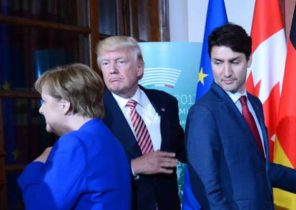
Since coming to power in the United States Donald trump earlier this year, American troops began to carry out military operations against cells of “al-Qaeda” in southern Yemen, and expanded coverage of drones. Observers see this as signs of transition to a new phase in the politics of the American administration towards the war-torn country.
Despite the increased interest from Washington to the situation in Yemen, which is accompanied by a process of strengthening the Arab coalition, which coordinates its actions with President trump, in particular, in operations on the West coast, brewing the next question becomes whether the Yemeni crisis of inter-Arab problems in international settlement which will deal with the United States?
While there is coordination between the Arab coalition and the United States to Yemen direction, the White house is in no hurry to take a clear position in relation to the fight against the insurgency. The local community explains the passivity of America that it seeks to expand its influence and maintain relationships with all stakeholders of the conflict. The recent press conference of U.S. Ambassador to Yemen Matthew Tueller shed light on Washington’s ambitions in Yemen.
Race strategic interests
Analyst Adnan HaShem believes that US policy in Yemen is moving in the direction of the revival of the initiative of John Kerry (a former Secretary of state), but it will happen after the establishment of third party authorities in the province of Hodeidah in Western Yemen. That is what is currently working the international community and the UN.
In an interview with Al Khaleej Online, HaShem noted that the United States and the European Union fear a change in Russian strategy in Yemen towards broader diplomatic steps after the July Moscow for the first time since 2011 received Yemeni Ambassador, appointed by the legitimate government of the country.
Before leaving the White house, Kerry took the initiative, which involves the formation of a national unity government (after the failure of all negotiations), which would unite all parties of the conflict. However, the Yemeni President refused to enter the government, because it considers that this is contrary to three things: the initiative of the countries of the Persian Gulf, the withdrawal from the national dialogue and of the resolution 2216 of the UN Security Council.
According to HaShem, the United States wants to achieve a breakthrough in resolving the Yemeni crisis and set the country world. This can be done by applying pressure on the government, recognized at the international level. By taking such steps, Washington is seeking to compete with Russia in Yemen, because of fears that it will create a military base near the Bab-El-Mandeb Strait.
A new stage
At the political level, the United States did not openly compete with Russia, but seek to take a balanced approach in relations with all parties to the conflict, including the rebels and those who support them. Political Washington’s presence in Yemen is not associated with the American role in resolving other regional conflicts. In this regard, the press conference of U.S. Ambassador to Yemen Matthew Tueller is the starting point for a new stage of settlement of the crisis with the participation of Ismail Ould Sheikh Ahmed. So, during the speech, the Ambassador supported the political solution proposed by the special envoy of the UN Secretary General on Yemen.
Journalist and writer Ali al-Faqih said that the statements of Tullera there were a lot of hints that his country will play a role in the Yemeni settlement in the new phase, which was preceded by more than a two-year period of the operations of the Arab coalition.
Arab News #Cartoon by @mohammedrayes1 #Yemen #Houthis pic.twitter.com/af79EQzWhQ
— Arab News (@Arab_News) on may 26, 2017
In an interview with Al Khaleej Online Faqih noticed that the press conference of the Ambassador was a kind of Declaration of a new stage in US policy on Yemen direction, which was practically frozen after the presidential election and the arrival of the trump in the White house, and the last formal step by the US administration in Yemen was the initiative of Secretary of state John Kerry.
Al-Faqih added that the Yemeni crisis in the previous period was primarily a problem of the States of the Persian Gulf, and today there is a certain decrease in activity, with the exception of military advances on the West coast. This, in turn, according to observers, resulted in the intensification of extra-regional players, which may impose on the Arab countries his vision of resolving the conflict.
Despite the fact that Tuller confirmed that his government supported the special envoy for Yemen, and the United States took an active position in relation to the crisis, al-Faqih said that the American administration is apparently not able to reach a settlement of the Yemen conflict. The fact that not more progress has been made militarily, and it is the cornerstone in a situation, especially in light of other crises in the region, which are of more importance to players than the situation in Yemen.
Al-Faqih, who was present at the press conference, also stressed that the us Ambassador has made it clear that the US intends to force all parties to the conflict to make concessions.
In his opinion, the Ambassador’s words about “sounding today the votes of the moderates that are able to do something” indicate the propensity of an approximate solution, which might stop the conflict, but will not eliminate its causes. The most striking evidence for this decision are initiative, Ismail Ould Sheikh Ahmed, who offers to put aside the problem of the port city of Hodeidah.
As said al-Faqih, these “retail” solutions do not serve the comprehensive settlement of the conflict, and represent the process of “local anesthesia” and attempt to go from the whole to the particulars.
Since the late 90-ies of the last century American-Yemeni military relations began to improve, especially after the explosion of the “al-Qaeda” us destroyer Cole in Aden on 12 October 2000, and was expanded after 11 September 2001.
However, Yemenis fear that the United States will establish full control over the situation in the country, without coordination with the legitimate government. They are afraid that their country will become a theater of war that would open the way for the adoption of any political decisions would meet the interests of external forces, but not the Yemeni people, to the detriment of the security and stability of the state.






